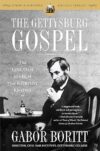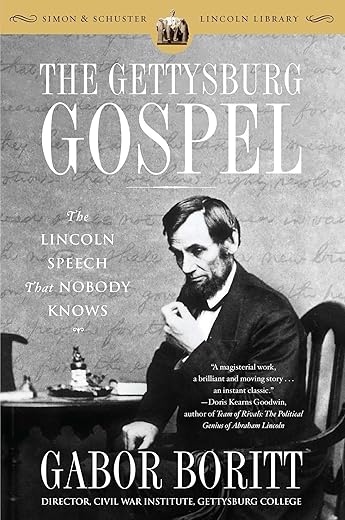
€4.10
The Gettysburg Gospel: The Lincoln Speech That Nobody Knows by Gabor Boritt Price comparison
The Gettysburg Gospel: The Lincoln Speech That Nobody Knows by Gabor Boritt Price History
The Gettysburg Gospel: The Lincoln Speech That Nobody Knows by Gabor Boritt Description
The Gettysburg Gospel: The Lincoln Speech That Nobody Knows by Gabor Boritt
Discover the lesser-known insights surrounding one of America’s most iconic speeches with The Gettysburg Gospel: The Lincoln Speech That Nobody Knows by Gabor Boritt. This engaging exploration, published by Simon & Schuster, offers a fresh perspective on Abraham Lincoln’s speech and its significance during pivotal moments in American history. This groundbreaking book combines rigorous scholarship with accessible writing, making it a must-read for history enthusiasts and casual readers alike.
Product Features and Benefits
- In-Depth Analysis: Delve into a critical exploration of the Gettysburg Address beyond its famous lines. Gabor Boritt unpacks the historical context and meanings that resonate today.
- Comprehensive Length: At 447 pages, this authoritative text provides ample content for readers seeking a complete understanding of Lincoln’s rhetoric and its impact on American ideals.
- Accessible Format: The reprint edition, released on February 5, 2008, is presented in a user-friendly paperback format. Size dimensions of 6.13 x 1.12 x 9.25 inches make it perfect for both personal libraries and on-the-go readers.
- Weight Consideration: Weighing in at 1.05 pounds, this book is lightweight for its length, making it convenient to carry while enjoying a deep historical dive.
- ISBN Details: The ISBN-10 is 0743288211, and the ISBN-13 is 978-0743288217. These identifiers help you find this essential volume effortlessly.
Price Comparison Across Retailers
When it comes to purchasing The Gettysburg Gospel, pricing varies across suppliers. Comparing prices can help you find the best deal. Make sure to look at multiple retailers to identify the lowest price available. Many online platforms offer competitive pricing, but you’ll often find some differences that can save you money!
6-Month Price History Trends
Examining the 6-month price history chart reveals insightful trends. Over the past six months, the pricing for The Gettysburg Gospel has shown a slight reduction, providing an excellent opportunity to purchase this title at a more affordable rate now. Tracking these historical price changes can help you make an informed buying decision, ensuring you get the best value for your investment.
Customer Reviews Summary
Customer feedback highlights the strengths and weaknesses of The Gettysburg Gospel. Many readers praise Boritt’s detailed analysis and engaging writing style. They appreciate how he sheds light on aspects of Lincoln’s speech that often remain overlooked. Positive reviews consistently emphasize the book’s comprehensive nature, making it an invaluable resource for those passionate about American history.
However, some readers noted that the depth of detail may be overwhelming for casual readers. Those seeking a quick overview may find certain sections dense. Balancing rigorous scholarship with readability is a delicate task, and while Boritt excels, not all readers may enjoy the level of detail presented.
Unboxing and Review Videos
For those who prefer a multimedia approach, there are various unboxing and review videos available on YouTube. These resources provide a visual insight into the book’s content and presentation. Watching reviews can further enrich your understanding of The Gettysburg Gospel and affirm your decision to purchase it.
Why You Should Read This Book
Understanding The Gettysburg Gospel by Gabor Boritt means enriching your knowledge of a crucial moment in United States history. This book is not just about the words spoken by Lincoln; it delves into the overarching themes of freedom, unity, and sacrifice that resonate deeply in today’s society. Engaging with this text is essential for anyone looking to grasp the intricate dynamic between history and rhetoric.
Incorporating detailed historical context, Boritt invites readers to appreciate the power and legacy of Lincoln’s address—elements that are often overshadowed by its more famous quotations. As you read, reflect on how these insights can inform our understanding of current events and debates surrounding unity in contemporary America.
Don’t miss out on obtaining this essential work that seamlessly melds history with accessible scholarship. Compare prices now! Find the best deal on The Gettysburg Gospel: The Lincoln Speech That Nobody Knows by Gabor Boritt and embark on a journey through America’s rich narrative.
The Gettysburg Gospel: The Lincoln Speech That Nobody Knows by Gabor Boritt Specification
Specification: The Gettysburg Gospel: The Lincoln Speech That Nobody Knows by Gabor Boritt
|
The Gettysburg Gospel: The Lincoln Speech That Nobody Knows by Gabor Boritt Reviews (6)
6 reviews for The Gettysburg Gospel: The Lincoln Speech That Nobody Knows by Gabor Boritt
Only logged in customers who have purchased this product may leave a review.








Paul –
After reading this book, I have a new appreciation of the Gettysburg Address.
While many people have an understanding of what Lincoln said, Gabor Boritt provides us a solid background on what Gettysburg went through after the battle. There was not adequate resources to care for the wounded, bury the dead, and dispose of the thousands of horses and mules that were killed in the battle. There was great courage displayed by many of the women of the town, and from outside of Gettysburg, but the first few days after the battle, Gettysburg was nothing more than a makeshift hospital. Every home had wounded; every church and public building converted to help the wounded, and doctors working at amputations until they had to be held up.
And, when Lincoln did come to the dedication on Nov 19 1863, the primary speaker was Edward Everett and it was his masterful oration that made the greatest impact on the audience and the press. Lincoln’s spoken words were not fully appreciated until decades after the event.
If you read a book and get nothing new out of it, you have wasted your time. That is not the case here. This book will give you a new insight on Lincoln and his words at Gettysburg that will live for centuries.
Konrei –
We all know—or think we know—the story of the Gettysburg Address; how Abraham Lincoln jotted a few words on the back of an envelope while on a train en route to dedicate the new military cemetery at Gettysburg; how he gave the speech and the crowd was moved to reverent silence; and how, ever after, the Gettysburg Address has been a mainstay of the secular religion that is the idea of America.
Except, as Gabor Boritt, the Director of the Civil War Institute at Gettysburg College shows us, that story is all wrong—no, not wrong; myth. And myths do not have to have happened in order to be true.
The hard core of that myth comes from a little book called THE PERFECT TRIBUTE by Mary Shipman Andrews, first published in 1906, and republished and reimagined as a stage play, a movie and a TV show many times since. Boritt does not even tell us this until near the end of his text; other parts of the Gettysburg story are more crucial and contributed to the writing of THE PERFECT TRIBUTE, but Andrews’ mythologizing has become the accepted history.
Even scholarly sources tend to focus on the magnitude of Lincoln’s Address: “Lincoln was preceded by a famous orator of the day who droned on for two hours. Nothing is remembered of what he said.” Occasionally, a source will identify the “famous orator” as Edward Everett, and change the “nothing” to “little,” but Boritt highlights the truth that in 1863 and for years, nay decades, thereafter, when the term “Gettysburg Address” was used, the term referred to Everett’s speech.
Everett’s speech was very well known. A pundit of his day, and a masterful public speaker, Everett did what was common at the time; he prepublished his speech in numerous newspapers and journals, and so people who were not at Gettysburg experienced the speech indirectly (more so than his live audience, because Everett edited his remarks on the podium). Boritt reproduces Everett’s speech in full in one of the numerous appendices to THE GETTYSBURG GOSPEL. At over 11,000 words, it is ponderous for a 21st Century audience, but it is just what a 19th Century audience would have expected and loved, full of allusions to Athenian democracy, a detailed (if glorified) version of the battle, and a paean to the honored dead who’d fallen on the field. (The other appendices analyze the different written versions of the Lincoln speech in scholarly detail, and comprise 50% of the entire book.)
Lincoln’s remarks were not prepublished. They ran to only 276 words. And though newspapers of the day published Everett’s remarks in full (often having a supplied printed copy to work with) far fewer papers published the President’s remarks, which were described as “rough and unpolished,” minimized as “a few suitable dedicatory remarks,” outright attacked in the Copperhead press and the South, since “In speaking of ‘a new birth of freedom’ the President proved he must have negro blood,” and absurdly misquoted: “The refinished work” (‘as in furniture?’ Boritt asks parenthetically) and “The dead will not remember what we say here.” You think? Indeed, Boritt shows us that public criticism of Lincoln was, if anything, uglier and less restrained than public criticism of any modern President, including Barack Obama.
The reality of Lincoln’s speech is that, as Professor Boritt shows us, it did not come to the fore until after the end of Reconstruction and after the systemic re-disenfranchisement of African-Americans through Jim Crow was accomplished at the end of the 19th Century. As “The Great Emancipator” faded from the (White) American consciousness, the “Gettysburg Lincoln” took his place. The scroll that Lincoln grasps or reads from in innumerable paintings and sculptures is often now identified as the Address, where it was originally identified (and usually meant to be) the Emancipation Proclamation. The effective erasure of the Proclamation became a part of the reunification process for the country. Not for nothing does the great Lincoln Memorial in Washington have carven in its walls the Gettysburg Address and the Second Inaugural, but it lacks the Proclamation, which affected millions of human beings immediately and forever.
But if it supplanted the idea of the Emancipator, the Gettysburg Address added immeasurably to the dignity in which the Office of the President is cloaked (if not always the men who fill that office). While Lincoln was invited to Gettysburg as an adjunct speaker to Everett, any President would now be the keynote speaker, and his words would be faithfully reported and thoroughly discussed. The iconic Lincoln who arose after Gettysburg (aided and abetted by his martyrdom at war’s end) redefined the Presidency forever as a magisterial office of great power, an office commanding a bully pulpit, and an office, which, when filled by flawed humans of good intent, can elevate both the man and the nation to greater things. In that sense, every President since Abraham Lincoln IS Abraham Lincoln.
J. Copeland –
This puts so much in perspective regarding the Battle of Gettysburg and what motivated Abraham Lincoln to write the “few appropriate remarks” at the dedication of our first National Cemetery. Highly recommended.
Judy T. Hewitt –
-iT GIVES A GOOD IMAGE OF what Abe Lincoln was thinking about as he was writing his speech for Gettysburg. It gives feeling from a variety of people who were in were in attendance.
It is surprising how long it took for Abe’s speech to become popular.
carolyn sue corbett –
Abraham Lincoln is my husband’s favorite person. I bought the book as a gift for him. He said the book is wonderful and insightful.
Don –
Its hard to think that so many passed these great words over for so long. Gabor Boritt gets every peice of this day down to the smallest detail. If you really want to know about that day read this.